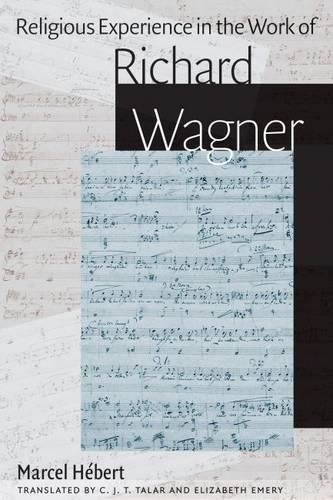Readings Newsletter
Become a Readings Member to make your shopping experience even easier.
Sign in or sign up for free!
You’re not far away from qualifying for FREE standard shipping within Australia
You’ve qualified for FREE standard shipping within Australia
The cart is loading…






Enthusiasm for the operas of composer Richard Wagner (1813-1883) flourished in fin-de-siecle France, fed by fascination for the medieval history and literature that inspired his work. By the 1890s,
pilgrimages
to Wagner’s burial city of Bayreuth, Germany, home of a regular festival of his work, were a rite of passage for musicians and the upper crust. French admirers promoted Wagner’s ideas in journals such as La Revue wagnerienne, launched in 1885. These writings fueled a mystique about Wagner, his music, and his beliefs.
Philosopher Marcel Hebert developed his Religious Experience in the Work of Richard Wagner (1895) from this background of sustained popular interest in Wagner, an interest that had intensified with the return of his operas to the Paris stage. Newspaper debates about the impact of Wagner’s ideas on French society often stressed the links between Wagner and religion. These debates inspired works like Hebert’s, intended to explain the complex myth and allegory in Wagner’s work and to elucidate it for a new generation of French spectators.
Hebert’s discussion of Wagner, written for a popular audience, might seem an anomaly in light of his better-known academic philosophical writings. Yet Wagner’s use of myth and symbol, as well as his ability to write musical dramas that evoked emotional as well as cognitive response, resonated with Hebert’s symbolist approach to dogma, and the appeal to religious experience characteristic of Modernist thinkers in general. By writing about Wagner to discuss these themes, Hebert caught the interest of the educated readership who shared his concern about the clash of ancient faith and modern thinking, and who were receptive to his argument that both could be reconciled through his revisionist approach. Thus, Hebert turned Wagner and his work into a vehicle for popularizing the Modernist vision of framing religion through experience as well as knowledge.
$9.00 standard shipping within Australia
FREE standard shipping within Australia for orders over $100.00
Express & International shipping calculated at checkout
Enthusiasm for the operas of composer Richard Wagner (1813-1883) flourished in fin-de-siecle France, fed by fascination for the medieval history and literature that inspired his work. By the 1890s,
pilgrimages
to Wagner’s burial city of Bayreuth, Germany, home of a regular festival of his work, were a rite of passage for musicians and the upper crust. French admirers promoted Wagner’s ideas in journals such as La Revue wagnerienne, launched in 1885. These writings fueled a mystique about Wagner, his music, and his beliefs.
Philosopher Marcel Hebert developed his Religious Experience in the Work of Richard Wagner (1895) from this background of sustained popular interest in Wagner, an interest that had intensified with the return of his operas to the Paris stage. Newspaper debates about the impact of Wagner’s ideas on French society often stressed the links between Wagner and religion. These debates inspired works like Hebert’s, intended to explain the complex myth and allegory in Wagner’s work and to elucidate it for a new generation of French spectators.
Hebert’s discussion of Wagner, written for a popular audience, might seem an anomaly in light of his better-known academic philosophical writings. Yet Wagner’s use of myth and symbol, as well as his ability to write musical dramas that evoked emotional as well as cognitive response, resonated with Hebert’s symbolist approach to dogma, and the appeal to religious experience characteristic of Modernist thinkers in general. By writing about Wagner to discuss these themes, Hebert caught the interest of the educated readership who shared his concern about the clash of ancient faith and modern thinking, and who were receptive to his argument that both could be reconciled through his revisionist approach. Thus, Hebert turned Wagner and his work into a vehicle for popularizing the Modernist vision of framing religion through experience as well as knowledge.